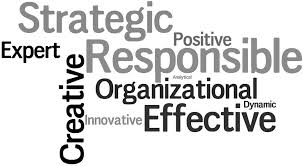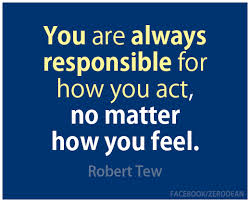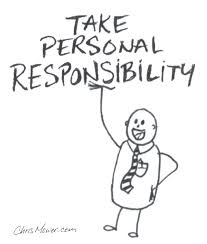How responsible are you and your employees?
 Responsibility is key to creating excellence in personal and organizational performance.
Responsibility is key to creating excellence in personal and organizational performance.
Responsibility is a key factor in determining how well an organization performs. Organizations are made up of people and when people take responsibility for their actions and behaviors things get done on time and the right way. Highly responsible people are actually response able. In other words, they are able to respond to people and situations more appropriately. They function at a higher level in every way, intellectually, emotionally and physically. They don’t make excuses and blame others.
Of course, nothing is perfect and things don’t always go as planned. But responsible people will take action when there are problems that stand in the way from expected results. They will communicate with those involved, so everyone knows what the problem is and how it is being dealt with.
 Responsible people not only get more things done with higher-quality, but they also take responsibility for how they interact and behave with others. This applies to everyone they communicate with, customers, suppliers and coworkers.
Responsible people not only get more things done with higher-quality, but they also take responsibility for how they interact and behave with others. This applies to everyone they communicate with, customers, suppliers and coworkers.
Attitude
Responsible people demonstrate a more positive and mature attitude toward situations and people. They’re better able to respond to challenges and to sensitive issues.
Can responsibility be taught?
We cannot change people, but we can teach people to be more responsible and accountable. How difficult is this? It all depends on the person and the culture of the organization. Responsibility is linked to someone’s personal beliefs, values and attitudes. It is also a reflection of their intellectual and emotional maturity and this can grow through personal development.
Of course it’s best to hire people with the right attitudes to start with. But sometimes we make mistakes or people develop bad attitudes for various reasons. Situations that occur with coworkers can cause people to become disengaged in their work and take less responsibility.
Leaders of organizations need to define their personal and organizational values in order to create a culture that supports responsibility. These values can be translated into expected behaviors that the organization wants to see from its employees. These must be communicated as part of job expectations.
Personal development training, such as leadership and team development must contain components of attitude development towards becoming more responsible and accountable. Teams cannot grow. If there is a lack of responsibility amongst team members.
Training
 Even with personal development training people do not always get the message and make the effort to change their attitude and become more responsible.
Even with personal development training people do not always get the message and make the effort to change their attitude and become more responsible.
One good analogy is the high school dance. Those who had great attitudes and participated in extra curriculum school activities, such as the dance were so excited about it that they helped organize the event. They also were the first ones to get up on the dance floor. They would also encourage others to participate and dance. Those who were less self-assured and perhaps shy, would come to the event, but take time to get up the nerve to ask somebody to dance, if they did at all. But they weren’t the problem ones because at least they showed up and made an effort. It was those that found a way to sneak in and stayed only long enough to put the whole thing down before they went to the pool hall to drink, smoke and talk down on everyone who was still at the dance.
These are the people who are very hard to change, and if they don’t show a willingness after some time and encouragement, then it is time to have them move on.
It’s the responsibility of the leaders of organizations to ensure that they hire develop and retain highly responsible people who will drive a culture of excellence, continuous improvement and innovation. This is the only way to survive and thrive in an ever competitive global economy.
Stephen Goldberg